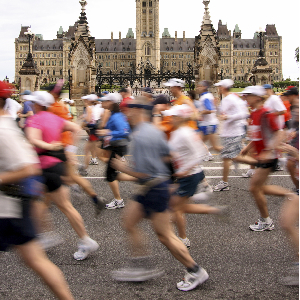Vigorous Exercise Increases Risk of Heart Disease

In my search for the best in holistic medicine I have traveled the globe and spent time with healers of all types: shamans, psychic surgeons, qigong masters, faith healers, herbalists, bone setters… you name it.
While studying a method of qigong known as zhan zhuang (pile standing) in Asia, my teacher told me something very strange. He said: “This qigong exercises forces you to stand still and not move for a long time. Because of this, your energy will increase, your body will warm, and your muscles will strengthen. But you will not damage your joints from excessive movement, nor tax your heart through robust movement, nor damage the lungs through too rapid respiration.”
I have to say that I had trouble swallowing this last part and for the past 15 years I have been trying to reason out in my mind: why not increase heart rate and respiration? After all, isn’t the entire fitness industry in the Western world based on elevating heart rate, increasing lung capacity and burning calories from sweating and muscle strength development? Well, like with so many other things, it looks like the ancient Chinese knew what they were talking about.
Recent research coming out of New York University Medical Center suggests that the more often one engages in vigorous exercise the greater their risk of developing atrial fibrillation (AF). AF is a condition characterized by irregular, rapid heart rate, which affects people in many ways from simple fainting to heart failure and stroke.
But isn’t this always the way? First something is bad for you, then good for you, then bad for you again. Don’t raise the heart rate doing vigorous exercise, said the ancient Daoist masters. Train hard and break a sweat and elevate the heart, said the masters of sport science. Sweating and elevated heart rate lead to heart disease, now say the academics—but with more tangible and less metaphoric examples for the whys of it.
Odd thing is; there are always two sides to every coin. It’s not always so easy as good vs. bad, but the degree of good vs. bad on a continuum depending on who you are and where your health condition is. For relatively healthy people with no serious biological health issues, exercise has been proven time and again to balance the body and stave off potentially life-threatening diseases, like obesity and diabetes. However, if on the other hand you do have unrecognized heart disease, then exercise may cause you to die from sudden heart attack. And the leading cause of exercise-related death among high-level athletes is coronary heart disease!
Before you decide that you do or don’t have heart disease, there’s more to the study that is important for you to know. In the study there were exercise and non-exercise groups. Men who exercised long or hard enough to break a sweat five to seven days per week actually increased their chances of developing AF by an enormous 20 percent! And the non-exercise control group? No increase in their propensity for AF.
The big surprise is this: the participants who were in the “break a sweat” group were deemed to be “healthy,” and made up of men under the age of 50 who run on a regular basis. Common sense would say the opposite results should be the case. But no, the study clearly shows that the incidence of atrial fibrillation in men who jog increased by a massive 50 percent! And it was up by 74 percent in young men who break a sweat on a regular basis!
By now you may be worried about your own condition. However, it seems that AF is common and even expected in so-called healthy athletes. This is the case because cardiomegaly (enlargement of the heart) is so common in athletes that doctors don’t even tell athletes they have a condition that can lead to heart disease. Yes, in normal, non-athletic people, if their electrocardiograms showed these same signs the docs would be very concerned and let them know.
The long and short is this: the essence of the study indicates that breaking a sweat on a regular basis is bad for your heart. And history shows that marathoners and other top athletes die at a young age as a result of heart disease. And in China, where tai chi and qigong are practiced by millions, the rate of heart disease and young heart-related deaths is among the world’s lowest.
No wonder slow-burn exercises like walking, yoga, tai chi and qigong are considered as the safest and most effective exercises around the world. And the world is a whole lot bigger than the “experts” in the United States that get all the press.



0 Comments:
Post a Comment
<< Home